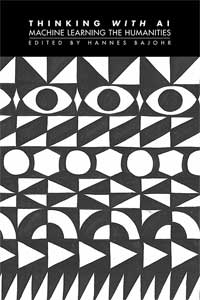Thinking with AI: Machine Learning the Humanities
edited by Hannes Bajohr

- Technographies
- Published: 2025
- ISBN: 978-1-78542-141-9
- PDF ISBN: 978-1-78542-140-2
This collected volume explores a novel approach to the intersection of artificial intelligence and the humanities, proposing that instead of merely writing about AI, scholars should think with AI. Rather than treating AI as an external subject of study, the essays explore how concepts from artificial intelligence, machine learning, and data science can provide ways to rethink core humanistic questions of meaning, representation, and culture.
Critical AI Studies typically focuses on AI’s societal implications—its role in surveillance, exclusion, and global capitalism. This volume extends that critique, but also explores how AI brings our already existing understanding of aesthetics, language, history, and knowledge into relief and stands in an often productive conflict with them. AI’s pattern recognition and generative capabilities, for example, provokes new ways to grasp aesthetic unity, reimagine language as an autonomous system, and reconsider the boundaries between text and image.
The essays illustrate how AI can be used as a productive metaphor and intellectual tool for the humanities. From formalizing concepts like Stimmung and vibe to challenging traditional distinctions between writing and thought or between history and data, the book shows how AI can be not just an object of study but a conceptual catalyst that ignites unexpected connections to long-standing humanistic concerns. By engaging AI in this way, scholars can not only critique it but also expand the horizons of their own fields. With essays by Peli Grietzer, Leif Weatherby, Mercedes Bunz, Hannes Bajohr, Fabian Offert, Lev Manovich, Babette Babich, Markus Krajewski, Orit Halpern, Christina Vagt and Audrey Borowski.
Editor Bio
Hannes Bajohr is Assistant Professor of German at the University of California, Berkeley. His research focuses on the history of German philosophy in the 20th century, political theory, and theories of the digital and AI. Bajohr’s academic texts have appeared in Configurations, Poetics Today, and New German Critique, among others. His most recent books are Schreibenlassen: Texte zur Literatur im Digitalen (Berlin: August, 2022), Ad Judith N. Shklar: Leben, Werk, Gegenwart (with Rieke Trimçev, Hamburg: EVA, 2024), and Digitale Literatur zur Einführung (with Simon Roloff, Hamburg: Junius, 2024); in 2025, his book Postartifizielle Texte: Schreiben nach KI will come out with Suhrkamp. Bajohr is also active as a writer of digital literature. His most work is the novel (Berlin, Miami) (Berlin: Rohstoff, 2023), which was co-written with a self-trained large language model.
